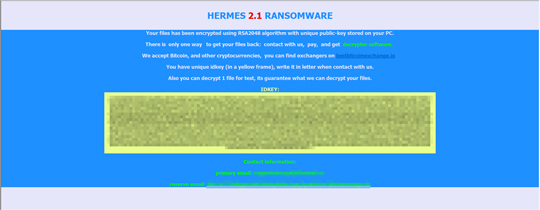Ransom.Win32.HERMES.THIBOAI
RDN/Generic.grp (McAfee); Trojan-Downloader.Win32.Dofoil.cfxn (Kaspersky); Trojan.Win32.Generic!BT (Sunbelt)
Windows


Threat Type: Ransomware
Destructiveness: No
Encrypted:
In the wild: Yes
OVERVIEW
This Ransomware arrives on a system as a file dropped by other malware or as a file downloaded unknowingly by users when visiting malicious sites.
It drops files as ransom note. It avoids encrypting files with the following file extensions.
TECHNICAL DETAILS
Arrival Details
This Ransomware arrives on a system as a file dropped by other malware or as a file downloaded unknowingly by users when visiting malicious sites.
Dropping Routine
This Ransomware drops the following files:
- %System Root%\Users\Public\PUBLIC
- %System Root%\Users\Public\UNIQUE_ID_DO_NOT_REMOVE
(Note: %System Root% is the Windows root folder, where it usually is C:\ on all Windows operating system versions.)
Ransomware Routine
This Ransomware avoids encrypting files with the following strings in their file name:
- WINDOWS
- DECRYPT_INFORMATION.html
- UNIQUE_ID_DO_NOT_REMOVE
It avoids encrypting files with the following strings in their file path:
- Windows
- AhnLab
- Chrome
- Mozilla
- $Recycle.Bin
It renames encrypted files using the following names:
- {Original Filename}[supportdecrypt@firemail.cc].HRM
It drops the following file(s) as ransom note:
- DECRYPT_INFORMATION.html

It avoids encrypting files with the following file extensions:
- dll
- lnk
- hrmlog
- ini
- exe
SOLUTION
Step 1
Trend Micro products with the XGen technology detect this malware as
Step 2
Before doing any scans, Windows 7, Windows 8, Windows 8.1, and Windows 10 users must disable System Restore to allow full scanning of their computers.
Step 3
Search and delete these components
- %System Root%\Users\Public\PUBLIC
- %System Root%\Users\Public\UNIQUE_ID_DO_NOT_REMOVE
Step 4
Scan your computer with your Trend Micro product to delete files detected as Ransom.Win32.HERMES.THIBOAI. If the detected files have already been cleaned, deleted, or quarantined by your Trend Micro product, no further step is required. You may opt to simply delete the quarantined files. Please check the following Trend Micro Support pages for more information:
Step 5
Restore encrypted files from backup.
Did this description help? Tell us how we did.


